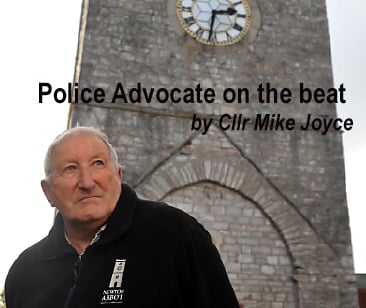I HAVE had the opportunity to meet Police and Crime Commissioner Alison Hernandez on several occasions.
Many people have come to rely on her to inform us of the many aspects and challenges that her role presents.
Recently I asked why she had put herself up for election.
Alison stated that at the time she was a councillor in Torbay. She saw the challenges faced by the police, public and businesses and thought she may be able to do more as Commissioner.
She is now in her second term of office with three years to go.
I was told she came in with a blank canvas, a chance to do things her way.
She spends a lot of time in the public eye, it’s the way she feels she can best understand the challenges and frustrations that many people feel.
High on Alison’s list of concerns is drugs.
She is aware that people expect quick results but believes it is a long journey involving a considerable amount of manpower and many partners.
She surprised me by saying that although cocaine and heroin grab the headlines the use of cannabis does not.
Senior officers do not see its possession, distribution or use as a priority.
However, Alison feels the use of cannabis is illegal and the first step towards the use of harder substances so will continue to make the point that it should be treated seriously.
Another area of importance to the Commissioner is the reduction of fatalities and injuries on our road. This is being targeted through Vision Zero and has brought a considerable change in the force’s priorities.
Alison has awarded grants to various bodies for speed monitoring equipment and there has been a considerable amount of realignment of the operation and resources available for speed watch.
I was assured this will remian one of the priorities for the remainder of her tenure.
I asked Alison if the recent publicity about more officers would actually materialise.
She said officer numbers would return to those around the level of 2016 but agreed it was still a far cry from the wishes of residents and businesses who want to see ‘bobbies on the beat’.
If there was a money tree or the Chancellor gave her a blank cheque-book, she said, things would be so different.
So what else is the Commissioner responsible for?
One topic is liaising with the Chief Constable to ensure they are aware of the frustration and needs of the people who elected her.
She cannot instruct a Chief Constable how to use their resources but can dismiss them and appoint a new one.
The Commissioner is responsible for the force’s budgets and has to liaise with the Police and Crime Panel – made up of representatives from councils across Devon and Cornwall – to discuss performance and cost.
I have often wondered many of us know who our representatives are on the panel, what they do and what their priorities and objectives are.
I can’t remember ever being consulted by a panel member.
I asked the Commissioner why her position is different from that of the original Police Authority that used to oversee the force.
I was told that people directly elect the Commissioner and can assess their performance.
Councillors who served on the Authority were appointed by other members and perhaps less answerable to the public.
One great success, I believe, of Alison’s terms of office has been the setting up of the Councillor Police Advocate Scheme.
The idea is quite simple: councillors are appointed by their respective authorities and communicate regularly with local officers providing an avenue to raise awareness or exchange information.
A beauty of the scheme is that it can be adapted to suit any given area.
It was stressed right at the very beginning that the one-size-fits-all approach would not work.
We now have more than 360 councillor advocates in the two counties, there’s still a long way to go but it’s a start and something I am proud to have been part of from the very beginning.
The Commissioner said that given the scheme’s success it might be an opportune time to expand into other areas like the NHS, Chambers of Trade, charities and support organisations .
I raised the matter of the police helicopter service, the future of which is unclear with the current national operator having served notice.
Alison stated that arial coverage forms an integral part of policing and that various options were being considered.
But she believes that within five years the advancement in drone capabilities may well render helicopters all but redundant anyway. Time will tell.




